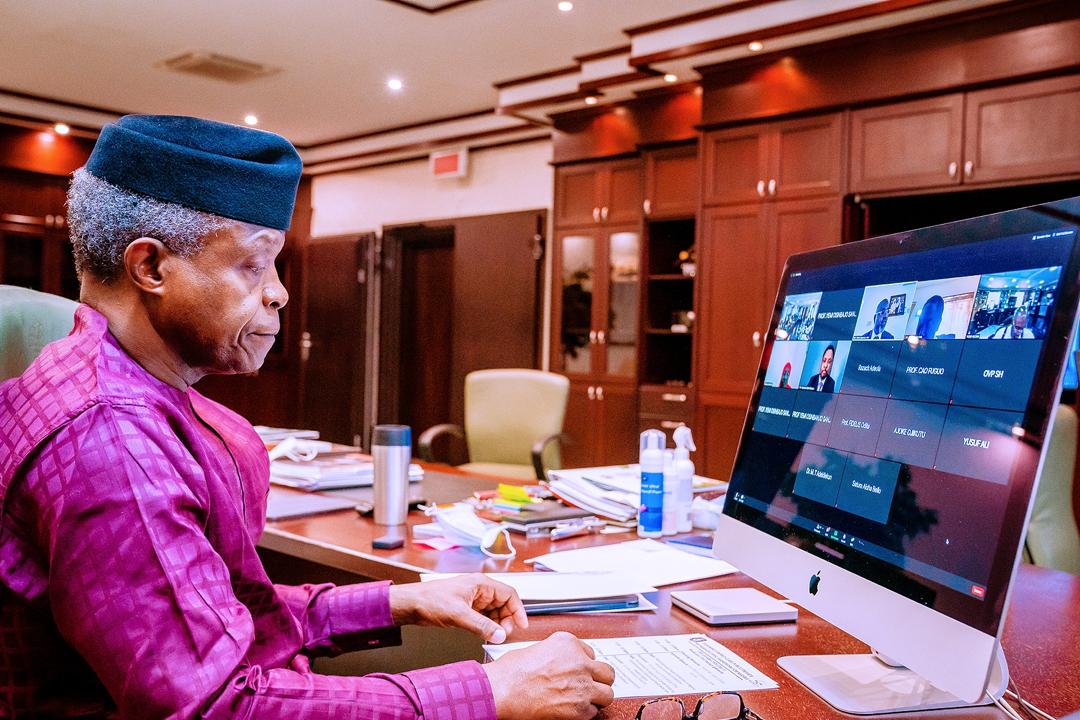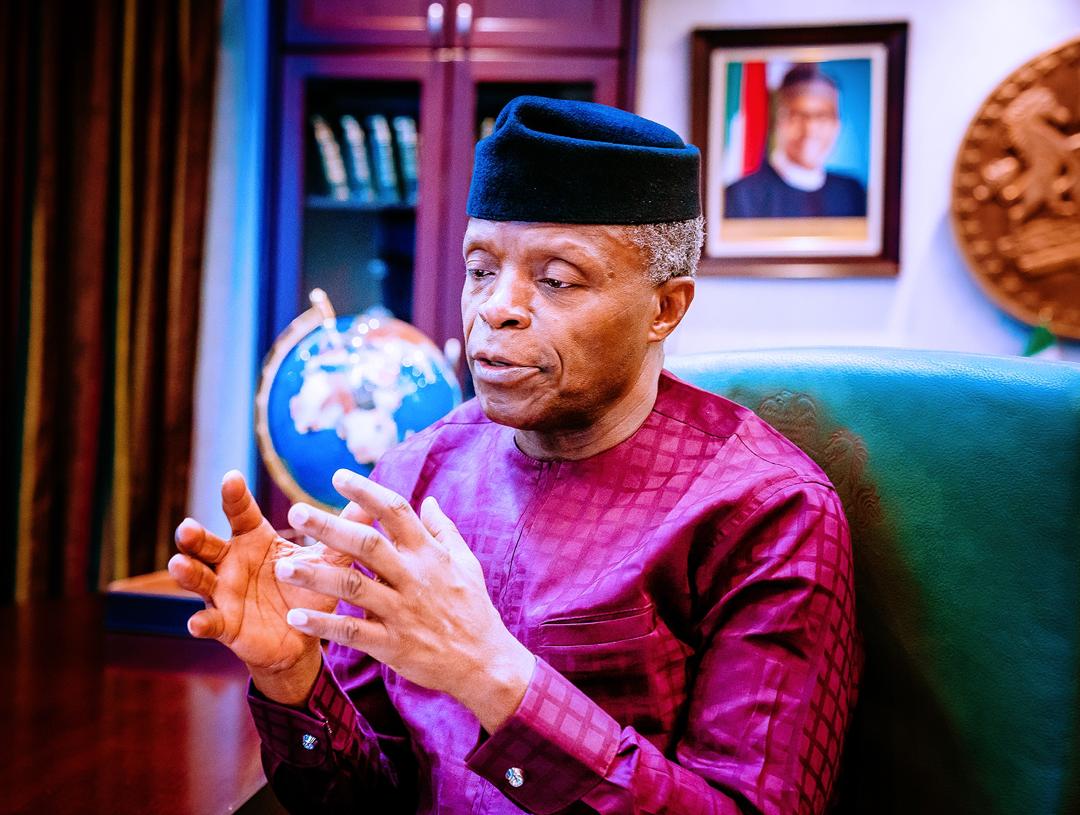VP’s Remarks At Yusuf Ali & Co’s Webinar On Public Private Partnership
REMARKS BY HIS EXCELLENCY, PROF. YEMI OSINBAJO, SAN, GCON, VICE PRESIDENT, FEDERAL REPUBLIC OF NIGERIA, AT WEBINAR ON PUBLIC PRIVATE PARTNERSHIP, ON TUESDAY OCTOBER 13, 2020
The Business Law Department of the Faculty of Law University of Ilorin and the Law Firm of Yusuf O. Ali & Co, deserve praise for the partnership that has provided the platform for this very important discussion on Public Private Partnerships (PPPs).
I think we should also congratulate them for practicing what they preach. This collaboration between a Federal University and a private law firm is a remarkable example of a Public Private Partnership.
There can hardly be a better time to explore the use of PPPs especially in the delivery of public infrastructure. First, public revenue both for States and the Federal Government have fallen precipitously in the wake of the disruptions of the COVID-19 pandemic.
Besides, for the Federal Government, barely 30% of the budget is available for capital expenditure, besides a national infrastructure deficit. So, clearly there is a need to bring in the considerably larger size of private capital to participate in public infrastructure projects. Just to demonstrate how much resources lie in the hands of the private sector.
Dangote’s Lekki project comprising a refinery, fertilizer factory and a subsea pipeline is estimated to cost USD15 billion. (About N6 trillion almost half of the entire federal budget of N13 trillion). Also access to capital from international commercial lenders is cheaper for private companies with a good reputation.
Private sector partnership with the public sector also brings in the discipline of execution and expenditure which is often missing in government projects. And this is again a matter that I hope you will deliberate on. Even with PPPs, you will sometimes find that the inefficiencies and bureaucracy of the public sector hold down the execution of PPPs. So, here you find that the PPP is an attempt to bring in private sector credit into execution of contracts and I think this is helpful because it helps discipline the public sector implementation process which is usually bucked down by bureaucracy. These factors have largely informed our government’s clear preference for PPPs. We have also sought to create a conducive policy and legal environment for PPPs to thrive.
In 2017, we introduced the Road Trust Fund (RTF). The fund is a tax credit scheme to incentivize private sector participation in the development of federal road infrastructure. The relief is enjoyed by a deduction of 50% of the amount spent on the project from the income tax that would have been payable by the company.
Also, by Executive Order No. 007 of 2019, the Companies Income Tax (Road Infrastructure Development and Refurbishment Investment Tax Credit Scheme). The objective of the Scheme is to accelerate public road infrastructure development by incentivizing private sector entities to construct and refurbish eligible roads across the country in exchange for tax credits, which could then be applied against company income tax payable.
Nineteen roads have been approved so far by Mr. President under the Scheme, totaling, 780.15 km. These roads, in eleven (11) States across the six geo-political zones, are being executed by six (6) private sector players in the manufacturing and construction industries. The private sectors would cover the cost of the work and then utilise tax exemptions to reduce their corporate taxes until they are able to fully recoup the value of their investments.
Already, work has commenced on some of the roads:
a.The reconstruction of Apapa-Oshodi-Oworonshoki-Ojota Road in Lagos State (34 km) by Dangote Industries Limited is under this scheme.
b.The reconstruction of Obajana-Kabba Road in Kogi State (43km) by Dangote Industries Limited.
c.The construction of Bodo-Bonny Road and Bridges across Opobo Channel in Rivers State (38km) by the Nigerian Liquefied Natural Gas Limited.
These are some of the examples of those that are already benefiting from this Executive Order No. 007 of 2019 tax credit scheme.
In thinking through the PPP framework, we must also think through some of its challenges, especially in PPPs where the private partner’s compensation is from user-based payments such as tolls on roads, or charges or fees in an airport concession, for example. We should be look at some of these challenges that arise as a result of user payment. These user payments of course depend on the public’s ability and or willingness to pay. And this is quite important because in some of the models that we have seen so far, there have been issues around the willingness to pay or the ability to pay. For example, sometimes the public’s reaction to paying tolls on a concessioned road, which they had been using for free before a concession, is to resist payment. We saw that with the Lekki-Epe concession.
I had the privilege of working on that concession while I was Attorney- General in Lagos. It was perhaps one of the best models that you could find. A number of foreign banks and infrastructure companies were involved in it. It was really quite a well put together concession, if one may say so. But it ran into problems because of the willingness of the public to pay. And part of the reason was because this road was a road that was already been used free of charge in a very densely populated area. So, there were arguments around the question of why should government concession this road. Obviously, the road had improved and private sectors parties had taken over.
Eventually, the state government had to buy out the private sector parties. But this was largely on account of some of the issues I have tried to describe. In such situations, the standard practice is also to ensure that the public have an alternative route which is one of the questions that frequently arises with road contracts; that you are going to concession a road that people have been using before, so, people will insist that you ought to have an alternative route. Now, again, there are cost issues as you can imagine. You are trying to create a public sector infrastructure, using private capital, but you have to satisfy the social needs of the people also, which invariably obviously, means higher costs, and all of these things have to be thought through at the stage of planning the concession, otherwise the entire project might fail.
So, in these sorts of arrangements, and especially in Greenfield projects where there is no precise way of predicting traffic or other forms of demand, there’s usually a need also for government to provide some subsidy or guarantee to mitigate demand or revenue shortfalls. So this happens, you know, very frequently, where you have a Greenfield project. There is no way of predicting how, what sort of revenues you will make, this is an entirely fresh project, say it’s a road project or something no one else has had any experience, there’s no historical data to show what revenues there will be.
So, in many cases, even in negotiating the concession, private parties will be asking for some kind of guarantee to mitigate demand risk or revenue shortfall or a subsidy. Now this is another tricky issue, the subsidy of guarantees well designed, good financial models must be used to prevent disputes or breaches and it may be necessary to limit or share such risk.
But despite its many challenges there is simply, in my view, no alternative to PPPs, the public sector will hardly ever be in a position to pay for all public infrastructure. So, we must continue to interrogate the ideas, models and best practices. And this is why I believe that this webinar is both timely and proactive. And I certainly look forward to the reports of the conversations that you will have here today. I see that we have an incredible panel of participants and discussants. We certainly need all the creative thinking around providing the best PPP structures that we can find.
And I think that we need to take a look at some of the models that we’ve seen already, some of those that have worked. Some of those that have become problematic and ended up in courts, they must not discourage us. If you look at PPPs anywhere in the world, many of them had teething problems, many had to end up in some form of dispute resolution and all that, but I think that this must not discouraged to us at all. As a matter of fact, these are lessons to be learned that we must build on that.
I must commend our chief host, my dear Senior brother, Mallam Yusuf Ali, SAN, founder and senior partner of Yusuf Ali & Co, the man whose professionalism, his contributions to ethical practice of law and personal integrity, in whom I have the greatest admiration.
It is now my privilege to declare this webinar formally open.
Thank you and God bless you.




